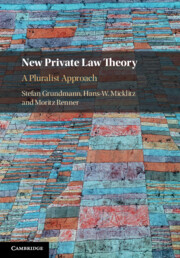Book contents
- New Private Law Theory
- New Private Law Theory
- Copyright page
- Contents
- Preface
- New Private Law Theory
- Part I Methods and Disciplines
- Part II Social Ordering, Constitutionalism and Private Law
- 6 Societal Order and Private Law
- 7 Values in Private Law
- 8 Constitutionalization, Regulation and Private Law
- 9 Democracy and Private Law
- 10 Formalism, Substantive and Procedural Justice
- Part III Transactions and Risk: Private Law and the Market
- Part IV Persons and Organizations
- Part V Private Law (Rule-Setting) beyond the State
- Index
- References
10 - Formalism, Substantive and Procedural Justice
from Part II - Social Ordering, Constitutionalism and Private Law
Published online by Cambridge University Press: 09 April 2021
- New Private Law Theory
- New Private Law Theory
- Copyright page
- Contents
- Preface
- New Private Law Theory
- Part I Methods and Disciplines
- Part II Social Ordering, Constitutionalism and Private Law
- 6 Societal Order and Private Law
- 7 Values in Private Law
- 8 Constitutionalization, Regulation and Private Law
- 9 Democracy and Private Law
- 10 Formalism, Substantive and Procedural Justice
- Part III Transactions and Risk: Private Law and the Market
- Part IV Persons and Organizations
- Part V Private Law (Rule-Setting) beyond the State
- Index
- References
Summary
This chapter deals with the different, and changing, conceptions of justice underlying modern private law systems. The foundations of modern private law had been laid in the nineteenth century and the political revolutions of that time are still reflected in many private law institutions. However, in the course of the twentieth century, private law has undergone a thorough transformation. Formalist conceptions of justice and equality have been gradually replaced by ideas of material, or distributive, justice, which aim at achieving social change through the means of private law.
- Type
- Chapter
- Information
- New Private Law TheoryA Pluralist Approach, pp. 193 - 204Publisher: Cambridge University PressPrint publication year: 2021



